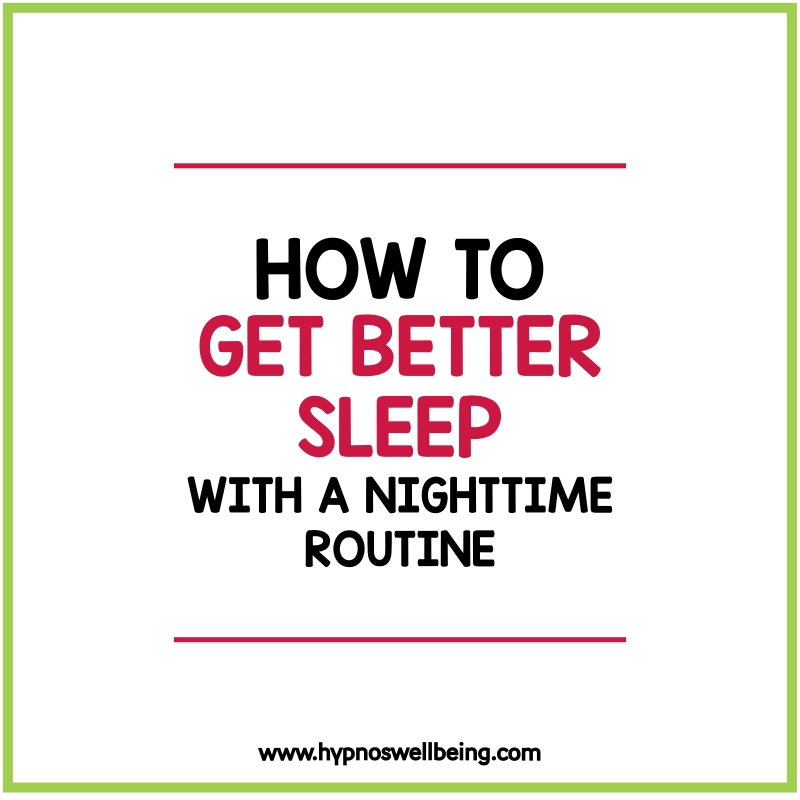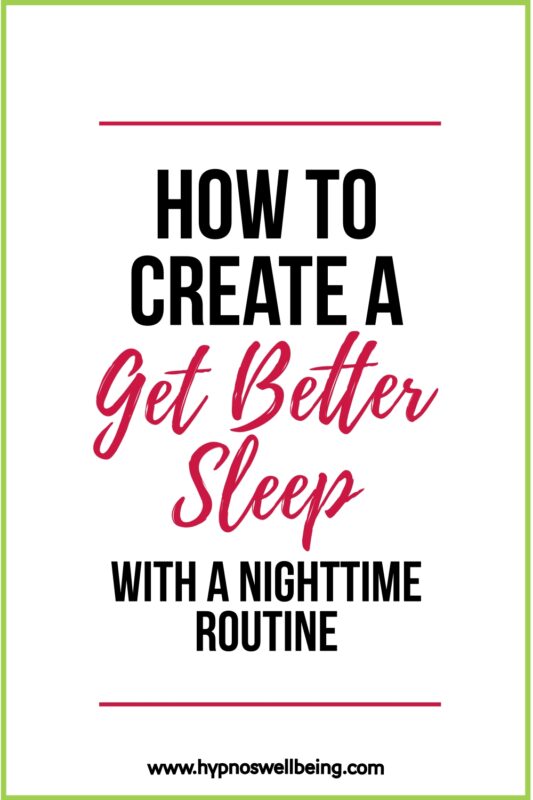Do you find it difficult to wind down at the end of the day? Can’t remember the last time you got a full 8 hours of uninterrupted sleep? Tired of waking up feeling tired? In this article, I’ll share some tips on how you can get better sleep with a nighttime routine.
Why you need a nighttime routine
Most of us grew up with some sort of nighttime routine. Or, at the very least, our parents/guardians tried very hard to establish one. And that’s because they knew that having a nighttime routine had so many benefits.
Nighttime routines help babies and children:
- Look forward to bedtime
- Fall asleep easier
- Stay asleep easier and longer
- Wake up feeling well-rested
And when children get consistent rest on a nightly basis, it can improve how they function and behave throughout the day – which can have a huge overall impact on their lives.
Guess what? These same benefits apply to all of us… regardless of our age! And the impact it has can be even more critical as an adult. When you get good rest, it can help you be more productive during the day, reduce forgetfulness, improve your mood, help you concentrate better, and so much more!
So, the next time you’re wondering whether it’s worth the effort to create or stick to a nighttime routine, remember that it’s a pretty simple thing that can make a huge, positive difference in your life.
Best Practices for Creating a Nighttime Routine
Like many things, there’s no one-size-fits-all answer to what your nighttime routine should look like. You could interview 100 people who feel like they have the perfect nighttime routine and discover that all of their routines are different. That’s because all of us have different needs and preferences. With that being said, I can’t tell you what your nighttime routine should be. What I can do, however, is share with you some general best practices. These are things that have been shown to be beneficial for a lot of people, so they’re worth trying out.
Be Careful What You Eat and Drink
One thing to keep in mind is that there are some food and drinks that you shouldn’t consume when you’re trying to wind down. Here are some things to avoid (and why):
Alcohol
A nightcap before bed might seem like the thing to do… and it can actually make you sleepy. However, it can mess with REM (rapid eye movement), which means you won’t get any deep sleep. It can also worsen sleep apnea.
Caffeine
Caffeine is a stimulant and, for most people, it will keep you awake instead of helping you go to sleep. If you’re going to drink coffee or tea at night, make sure it’s 100% decaf. Herbal teas are usually a safe bet, but even decaffeinated coffee can sometimes have small amounts of caffeine. You should also avoid dark chocolate and caffeinated soda before bed.
Protein, Fats, and Fiber
While you may think that eating food that is rich in fat, fiber, or protein will help you stay full during the night, they can also lead to indigestion. And that kind of discomfort can keep you up all night.
Spicy Foods
Love spicy food? If you’re trying to get good rest, you should try to have it for lunch instead of dinner, especially if you’re prone to acid reflux or diarrhea. Chili peppers, especially, contain an active ingredient called capsaicin that can actually change your body temperature while you’re sleeping. So, unless you want to wake up in the middle of the night to kick the covers off, try to avoid having it before bed.
Sugar
As delicious as a sweet treat for dessert can be, it’s not going to do you any favors when it comes to getting some rest. And it’s not just things like chocolate that have a lot of sugar — even a lot of fruit and yogurt can be high in natural sugar! Some low sugar fruit you can enjoy after dinner include watermelon, kiwi, avocado, blackberries, raspberries, and (surprisingly) strawberries. There are other options that are low in sugar (like lemons, limes, and grapefruit), but they’re also high in acid, so should be avoided if you’re prone to acid reflux. And if you’re looking for yogurt that doesn’t have any added sugar, Siggi’s is an amazing brand. Also reconsider having breakfast for dinner – especially if your favorite breakfast is cereal (which can be very sugary).
Nicotine
Nicotine is another stimulant, so smoking a cigarette or chewing tobacco is one of the last things you want to do. That includes e-cigarettes, nicotine patches,
It’s recommended that you stop eating about 2-3 hours before bed. So, if you want to be in bed by 9pm, try to finish eating and drinking no later than 7pm. You should also avoid drinking water right before bed… unless you enjoy late-night trips to the restroom to empty your bladder. Another tip is to avoid overeating. Going to bed on a full stomach means your stomach will be up late into the night digesting food instead of resting. Last, but not least, if you need to take medication before bed, opt for nighttime versions and avoid anything with pseudoephedrine.
Avoid Stimulating Activity
When it’s time for you to wind down for the evening, it’s best to avoid any activity that has the opposite effect. This includes (but is not limited to):
- Exercising (especially high-impact workouts)
- Using technology
- Messaging friends and family (you might get sucked into the convo and stay up too late)
- Reading emails (especially if you feel obligated to respond)
- Watching dramas or horror movies
- Anything that will keep you up, like watching your favorite movie, reading a new book, or starting a new crafting project
Start a Nighttime Ritual You Enjoy
I know that up to now, I’ve only talked about all the things you shouldn’t do before bed. Now let’s talk about some of the things you should do. And that’s anything that relaxes you, calms you, and makes it easier to fall asleep. Find a way to implement some of these into your nighttime routine. Here are some examples of things that you might find soothing:
- Turn off all electronics
- Reading a short book
- Watching an episode of a show you enjoy, but that you don’t mind falling asleep to
- Meditate
- Practice light yoga
- Listen to nature sounds or white noise
- Cuddle with your kids or pets
- Journal
- Plan the next day (so you can rest easy knowing you have a plan of attack)
- Have a warm cup of herbal tea (chamomile, lavender, lemon balm, magnolia bark, passionflower, and valerian root are great options)
- Take a hot bath (at least an hour before bed so your body has time to cool off)
If you find it difficult to fall asleep easily, start your nighttime routine a few hours before you need to be asleep.
Make Your Bedroom a Safe Haven
A big part of getting good rest is your environment. Make sure that your bedroom is conducive for that. Here are some tips to help you out:
Keep the room cool
It’s recommended that the temperature in your bedroom be between 60-67° Fahrenheit (15.5-19.4° Celsius). This will likely be easy to achieve in the cooler months, however, if you don’t have a thermostat, it can help to open your windows at night during the warmer months.
Turn off all electronics
If you tend to find yourself watching TV or scrolling social media late into the night, it might be best to make your bedroom a tech-free zone — at least at night.
Darken your room
Not only does light keep you awake- – it can also block the production of melatonin, which is a sleep hormone. Turning off the lights can help signal to your brain that it’s time for bed. Turn off all electronics as early as possible. You should also lower your shades to block out any light from outdoors (especially streetlights). If your closed shades or blinds don’t do the job well enough, you should invest in blackout curtains.
Reduce all noise
Noise can not only make it hard for you to fall asleep — it can also cause you to wake up in the middle of the night. Eliminate any noise you’re able to. If you live in an area with a lot of noise that’s outside your control, you should invest in noise-reducing/blocking products like soft earplugs or a white noise machine. It can also help to rearrange your room so that your bed is as far away from the noise sources as possible.
Make your bed comfortable
If there’s one piece of furniture in your entire house that should be high quality, it’s your bed. After all, you’ll ideally spend 7-9 hours per night sleeping in it each night! Invest in a mattress that is the perfect fit for you. Not too soft. Not too firm. You should also pay attention to what you put on top of the bed. You want sheets and blankets that make you feel nice and cozy – while also keeping your body temperature at optimal levels so you don’t wake up in the middle of the night looking for more cover or kicking them off. If you share your bed with a partner, this can be more of a challenge, but it’s definitely worth shopping around until you find the right match.
How to create your nighttime routine
Once you’ve identified all of the components that you think will be perfect for you (meals, activities, atmosphere, etc), it’s time to test it out! You might luck out and land on the perfect nighttime routine the first time around. But, if not, don’t stress! Just tweak things a bit and try again. It could take several attempts, but you’ll get it down eventually! Also, remember not to force it. If you’ve been laying in bed for an hour and still don’t feel tired, try repeating a couple of the things in your routine until you feel tired.
If you keep trying a nighttime routine that seems like it should be perfect, but you still find it impossible to get good sleep, it might be time to see a professional who can help you get to the bottom of any underlying issues and come up with a solution. If you’re interested in how I help my hypnotherapy clients master sleep problems and insomnia, book in for a free telephone consultation today!
Was this article helpful? If so, please share or pin it for others to see!



